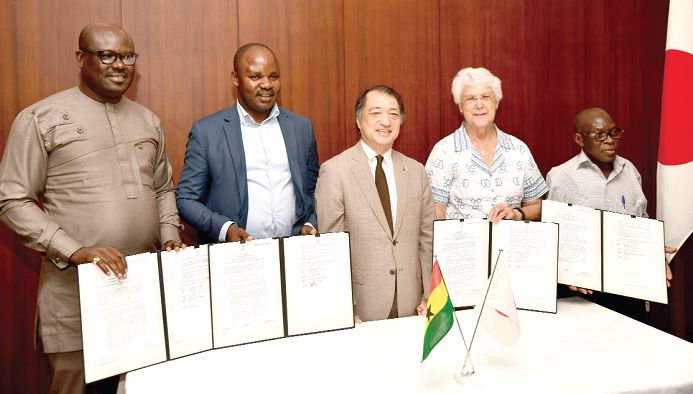
Japan supports four local projects with GH¢1.6m grant
The Japanese government has signed a grant agreement of $297,161 (GH¢1.6 million) with four local entities for the delivery of four projects in some communities.
The grant, which is for 2020, was issued under the Government of Japan’s Grant Assistance for Grassroots Human Security Projects (GGP) introduced in 1989 to support development needs in less developed countries due to diversity and it is administered annually.
The beneficiary entities are the Sekyere East District Health Directorate, the Shai-Osudoku District Assembly, the Centre for Integrated Education and Development (CIED)(which works in the Volta Region) and the Orthopaedic Training Centre at Nsawam.
The projects include the construction of two school blocks at Shai Osudoku at a cost of US$89,437 and the construction of a health centre at Nkawkwanua at a cost of US$90,866.
The others are the construction of a water supply facility at Bakpa and Mafi Traditional Area at a cost of US$77,579 and the procurement of a trekking van for the Orthopaedic Training Centre in the Eastern Region.
Signing ceremony
In brief remarks before the signing, the Japanese Ambassador to Ghana, Mr Tsutomu Himeno, said Japan agreed to support the aforementioned projects because they were found worthwhile, especially to help boost human and national security.
He also mentioned growing economic, political and social cooperation and relationship between the two countries as a reason for Japan’s decision to provide the grant.
He added that the decision was also made to “To keep alive the dream of the Japanese researcher Dr Hideyo Noguchi who died of yellow fever in Ghana in 1920 in his bid to find a vaccine for the disease.
Mr Himeno said Dr Noguchi’s dream led to Japan giving Ghana the Noguchi Memorial Institute for Medical Research (NMIMR) in 1979.
He stated that Japan was proud of the institute and its achievements and that was one of the reasons Japan was committed to supporting healthcare delivery in the country.
Benefits
The District Chief Executive Officer for Shai Osudoku District, Mr Daniel Akufo, who signed the agreement on behalf of his district, expressed gratitude to the people and government of Japan and said the school building project would benefit about 225 pupils.
He said the Ayenya D/A Basic School was in a very deplorable state, while some classes were held under trees due to insufficient classrooms.
“The project is expected to provide a very conducive environment for the pupils at the basic level and help to attract more pupils to school,” he said.
The Director of the Orthopaedic Training Centre, Sister Elizabeth Newman, said the new vehicle would contribute significantly to sustain the centre’s outreach services and would benefit over 2000 patients.
“The centre was established as a non-profit entity to provide rehabilitation support for physically challenged persons and in 1965 it opened its mobile unit in order to extend its services across the country,” she said.
The District Director of Health at the Sekyere East District Health Directorate, Mr Justice Ofori Amoah, said the Nkawkwanua community was one of the most deprived communities in the Sekyere East District and was currently receiving health care from an old structure which had been converted into a health post, with referral cases sent to Effiduase, the district capital, which is about 20 kilometres away.
The Executive Director of CIED, Mr Anthony Adanua, said the project, which would benefit about 2,153 people, was so much appreciated because currently the beneficiary communities in the Bakpa and Mafi areas in the Central Tongu District in the Volta Region got water from unsafe sources such as ponds.
Writer’s email
